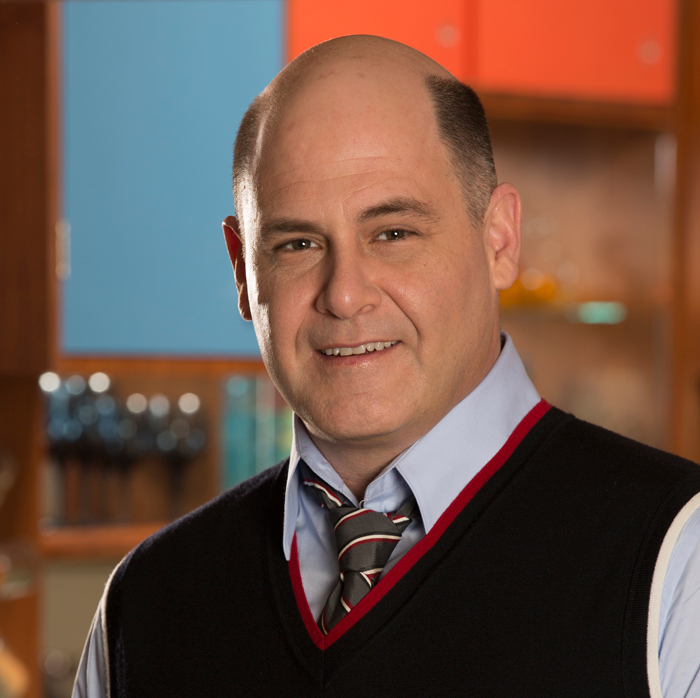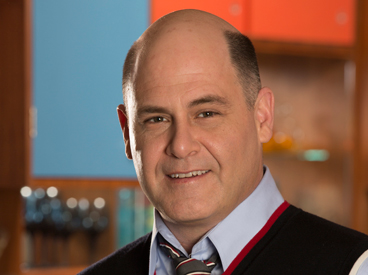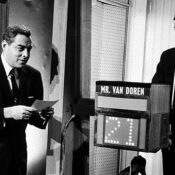
Matt Weiner, the creator of Mad Men, has a shelf full of Emmys and Golden Globes not to mention critical raves for the hit series now in its sixth season. The retro drama about a 1960s ad agency has left its mark on everything from fashion to the way we look at gender roles. So why is Weiner the first to admit he can be a little anxious about being at the top?
Maybe because he’s hardly an overnight success. He can laugh now about all the time he spent after grad school writing scripts, while his architect wife supported the family. Along the way, he wrote the pilot for Mad Men, but received nothing but rejections.
Weiner’s break came when he started writing for The Sopranos. That show was so hot it made his reputation, but even that wasn’t enough to sell HBO on Mad Men. Eventually it was AMC that took the gamble.
Weiner is charming—a great talker—but notoriously close-mouthed about where the series is going and whether the end is in sight. He’s already made his first bid to move to the big screen writing and directing with last fall’s You Are Here starring Zach Galifianakis and Jenna Fischer.
Question: How has success changed you?
Matt Weiner: I’m less combative. Finding an audience of even a few people after being rejected for a long time kind of recalibrates your perception of humanity, believe it or not. But I’m superstitious about the word success. It took awhile to realize that this really happened after years of privation and rejection. Ironically I’m the person who wrote, ‘Happiness is the moment before you need more happiness.’ So even the premise of the question, ‘How do you feel about success?’ is terrifying.
Q: What would you rewrite about yourself?
MW: I’ve got plenty of bad qualities that have not disappeared. I’m working on being more patient. That can be difficult to be around. I am very exacting. I think I can come off seeming unappreciative of the people closest to me sometimes because I have the complete expectation that I’m entitled to their affection. That’s probably my biggest fault—impatience.
Q: Are you different at home?
MW: I’m like every dad, I’m a joke. [He has four sons.] My anger’s a joke. My dissatisfaction’s a joke. My rules are a joke. I’m always fighting to enforce my authority. I work so much that when I come home and say, ‘Hey everybody, don’t do it this way,’ they’re like, ‘If you were here you’d know this is the way we do it.’ It’s like I’m powerless. You know what, once you take physical violence out of the equation, you really have no control over another person. [Laughs]
Q: Have you tried being a diplomat around the house?
MW: I lose my temper. I’ve got a bad temper. I’ll get mad and be swearing and using the ‘F’ word in the kitchen. Afterwards I’m so embarrassed and I look over at my kids in the next room and I’m like, ‘God, I hope they didn’t hear that.’ And I see they are laughing but trying to cover it up so they won’t embarrass me.
Q: What inspired you to be a writer and to stick with that unrealistic ambition?
MW: I had a lot of support from my parents. They loved and admired writers. We have a big poster of Ernest Hemingway in our hallway. I think that that mattered to me that they thought writing could be a heroic profession and a writer could make like a valuable contribution.
Q: What made you aim so high?
MW: I was a terrible student. I had a lot of mentors, teachers who encouraged me, kind of told me whether I believed it or not that I was a late bloomer. I gave a speech at my high school graduation and a dad in my class told me that I could be a TV writer. It wasn’t just any dad, it was Allan Burns who created The Mary Tyler Moore Show. And so I had that in my hip pocket. And then I went to college and did some acting and wrote poetry. Then I went to film school and was out of work for 5 years even though I was writing all the time. I tell people the hardest part about it was not knowing that it was going to be 5 years—it wasn’t that I was going do it, it was those years of not knowing when I was going to be a success.
Q: Don Draper the main character on the show says, ‘Everyone thinks this is temporary.’ Do you think that?
MW: I am extremely aware that the end is coming but not when. I’ve always had to sweat. I never have been sure Mad Men was going to go on again. I live and die by this thing. I want people to say, ‘That was the best season of the show ever.’ I want them to progressively say during the season, ‘That was the best episode of the show ever!’ I am always aspiring to keep it new and fresh. But you’re going to lose if you’re always trying to top yourself. You end up doing something crazy.
Q: You are pretty secretive about the plots of the episodes.
MW: I’m not trying to tease people. I just don’t want to give away to viewers what’s coming because not knowing what is going to happen is part of what keeps people interested. I think fans of the show, the ones who really love it, don’t want to know. But it is hard to talk about a new season without getting specific. At the beginning of a season I’m always like, ‘I’m starting a whole new story. If you don’t like it, then it’s not for you. But it’s not because it’s not as good as last year. It’s just different.’ No matter what happens you’ll be able to understand it. It’s a TV show, it’s not War and Peace.
Q: Are there lessons that having a huge hit have taught you?
MW: At a certain point you realize that being mature in this job is not thinking that you can do it all by yourself. You can’t forget that other people have the best stuff to offer and you need to be excited when you hear something you didn’t think about. I try to remember that I don’t always give enough praise. I get so much attention for my contribution to the series, and I wish I could share the glory a little bit more. I always mention the work of my producers and co-writers but it seldom gets printed. And I want people to know that that’s not my fault. That I try to share the wealth.
Q: What’s the right way to handle fame?
MW: I remember watching Jennifer Lawrence fall on the stairs as she went up to accept her Oscar. And I just thought, ‘If I were to write an acceptance speech, it would start like that.’ That moment to me was kind of like instant humility. She recovered with such grace and good humor. That’s a hard thing for people to understand. You just don’t want to attract the evil eye, become arrogant, rest on your laurels, and take it for granted.
Q: Does the great acceptance of the show give you more creative confidence?
MW: Trying to put a dream into words is a lot of what it is at the beginning of the season. And the ship leaves the port but you still don’t know if it’s any good. That’s the thing that never goes away. You don’t even know, even when the season’s over, even when you win an award, if you like pulled it off. And you know anyone who says they’re only interested in satisfying themselves is a fool.
Become a Saturday Evening Post member and enjoy unlimited access. Subscribe now



